600 - 500 BCE
The Prophet Jeremiah, the Babylonians and Cyrus the Great
After the death of King Josiah in 609 BCE, the succeeding Judaean kings, Jehiokim, Jehoachin and Zedekiah, led their citizens into idolatry. The Lord, speaking through Jeremiah says, “return to me, or I will send my servant Nebuchadnezzar against you.” (Jeremiah 25:9) The people did not repent and the Babylonians led a 20-year war against the Judeans, resulting in waves of expulsion to Babylonia and ultimately, the Destruction of the Temple of Solomon in 586 BCE.
Lamentation Scroll from the Dead Sea Scrolls discovered in Qumran, 1st Century CE, Israel Antiquities Authority
Photo by Shai Halevi
The Babylonians attack Jerusalem in 598 BCE
2 Kings 24:1
" In his days, King Nebuchadnezzar of Babylon came up, and Jehoiakim became his vassal for three years. Then he turned and rebelled against him."
City of David Megalim Institute, Courtesy of George Blumenthal and the Gol Family
In 598 BCE, at the urging of the Egyptian Pharaoh Neco, King Jehoiakim rebelled against Nebuchadnezzar. In response, the King of Babylon attacked Judah. When King Jehoakim died, his son, Jehoiachin took the throne. However, within a few months, the invading Nebuchadnezzar took King Jehoachin and the vessels of the Temple to Babylon and appointed Zedekiah King of Judah. King Zedekiah would eventually rebel against Nebuchadnezzar, prompting Nebuchadnezzar’s 588 BCE attack on Jerusalem. On the 9th of Av, 586 BCE, the Babylonians destroyed Solomon’s Temple.
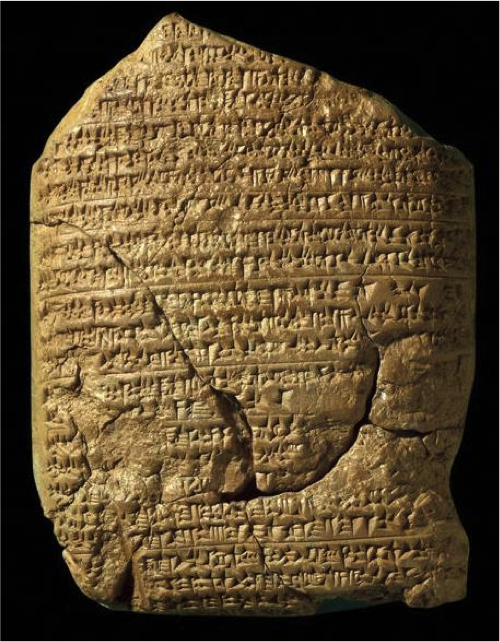
King Nebuchadnezzar of Babylonia Attacks Jerusalem, 597 BCE
2 Kings 24:10
At that time (of King Jehoaichin) the troops of King Nebuchadnezzar of Babylon marched against Jerusalem, and the city came under siege.
Chronicle of Nebuchadnezzar II
“The seventh year... He (Nebuchadnezzar) encamped against the city of Judah (Jerusalem) and on the second day of the month Adar he captured the city (and) seized (its) king. A king of his own choice he appointed in the city (and) taking the vast tribute he brought it into Babylon.”
The events of the Babylonian attacks on
Jerusalem are recorded in the Books of Jeremiah, 2 Chronicles and 2 Kings.
2 Kings 24:10 At
that time the troops of King Nebuchadnezzar of Babylon marched against
Jerusalem, and the city came under siege. Fascinatingly, the Babylonians also recorded
their version of the events, inscribed on clay tablets.
The use of
the Cuneiform, one of the oldest styles of writing enters history at this time.
Cuneiform means “wedge-shaped,” because people wrote it using a reed stylus cut
to make a wedge-shaped mark on a clay tablet.
This inscription, now displayed in the British
Museum, is known as the Nebuchadnezzar Chronicle. It highlights the conquest of Jerusalem by Nebuchadnezzar II and the surrender of Jehoiachin in 597 BCE, stating: “(Nebuchadnezzar)
encamped against the city of Judah and on the second day of the month Adar he
captured the city (and) seized (its) king.
A king of his own choice he appointed in the city (and) taking the vast
tribute he brought it into Babylon.”
The British Museum, London

Pergamon Museum, Berlin
King Jehoiachin of Judah, Is Exiled to Babylon, c. 597 BCE
2 Kings 24:15-16
He (Nebuchadnezzar) deported Jehoiachin to Babylon and the king’s mother and wives and officers and the notables of the land were brought as exiles from Jerusalem to Babylon.
All the able men, to the number of seven thousand—all of them warriors, trained for battle—and a thousand craftsmen and smiths were brought to Babylon as exiles by the king of Babylon.
Babylonian Ration List
This text lists the rations for King Jehoiachin and his family, while they were captive in Babylon.
This Babylonian Ration List tablet corroborates the Biblical story told of King Jehoiachin’s exile to Babylon in 597 BCE. From 2 Kings Chapters 24 and 25 we learn: (Nebuchadnezzar) deported Jehoiachin to Babylon and the king’s mother and wives and officers and the notables of the land were brought as exiles from Jerusalem to Babylon. … there was a continual allowance given to him from the king, every day a portion, all the days of his life. The text of the tablet lists the rations for King Jehoiachin and his family, while they were held captive in Babylon.
King Zedekiah of Judah
r. 597–586 BCE
2 Kings 24:17
Then the king of Babylon (Nebuchadnezzar) made Mattaniah, Jehoiachin’s uncle, king in his place and changed his name to Zedekiah.
Nebuchadnezzar Chronicle (Reverse, lines 11-13)
He (Nebuchadnezzar) set his camp against the city of Judah (Jerusalem) and on the second Adar he took the city and captured the king (Jehoiachin). He appointed a king of his choosing (Zedekiah), took heavy tribute and returned to Babylon.
Nebuchadnezzar replaced Jehoiachin with
Zedekiah as King over Judah, as 2 Kings 24:17 states:
Then
the king of Babylon (Nebuchadnezzar) made Mattaniah, Jehoiachin’s uncle, king
in his place and changed his name to Zedekiah.
Once again, this event is confirmed by a
Babylonian Chronicle which reads:
He
(Nebuchadnezzar) set his camp against the city of Judah (Jerusalem) and on the
second Adar he took the city and captured the king (Jehoiachin). He appointed a
king of his choosing (Zedekiah), took heavy tribute and returned to Babylon. Nebuchadnezzar’s vassal would eventually betray him.
Against the warnings of Jeremiah, King
Zedekiah rebelled against Nebuchadnezzar, and the Babylonians came to besiege
Jerusalem again in 588 BCE.

The British Museum, London
The Campaigns of Nebuchadnezzar into Israel
Jeremiah 34:1
The word which came to Jeremiah from the L-RD, when King Nebuchadnezzar of Babylon and all his army, and all the kingdoms of the earth and all the peoples under his sway, were waging war against Jerusalem and all its towns...
Jeremiah recorded Nebuchadnezzar’s invasions,
writing:
Jeremiah 34:1 The
word which came to Jeremiah from the L-RD, when King Nebuchadnezzar of Babylon
and all his army, and all the kingdoms of the earth and all the peoples under
his sway, were waging war against Jerusalem and all its towns…
On his way to Jerusalem, Nebuchadnezzar passes through
Azekah and Lachish.
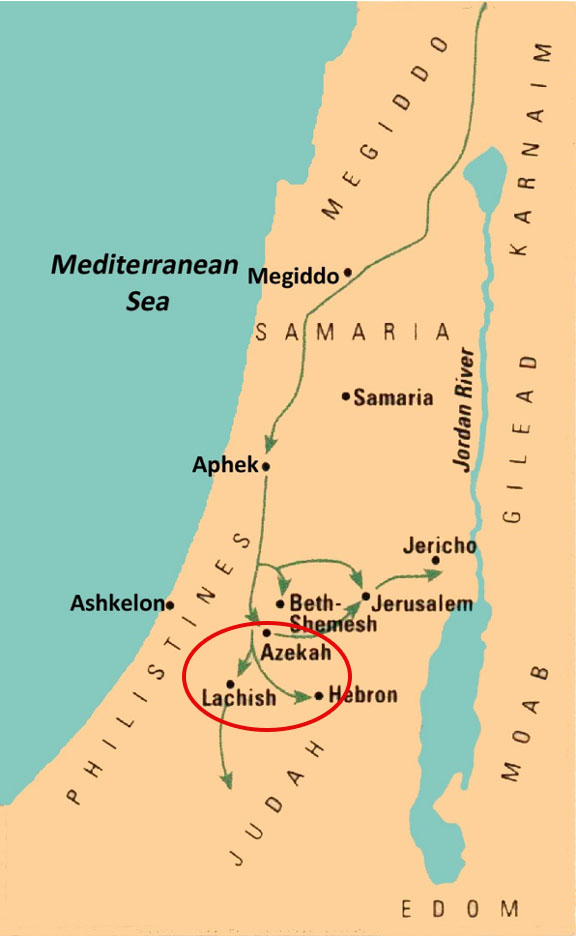
Biblical Archaeology Society
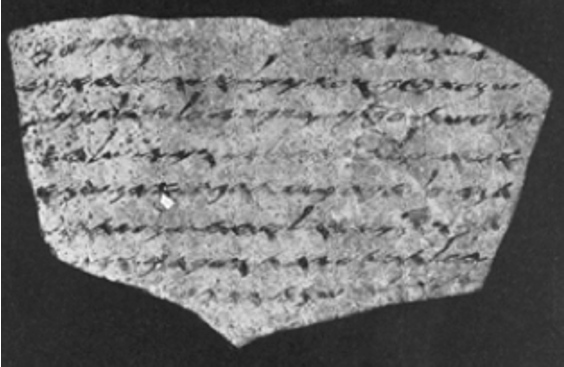
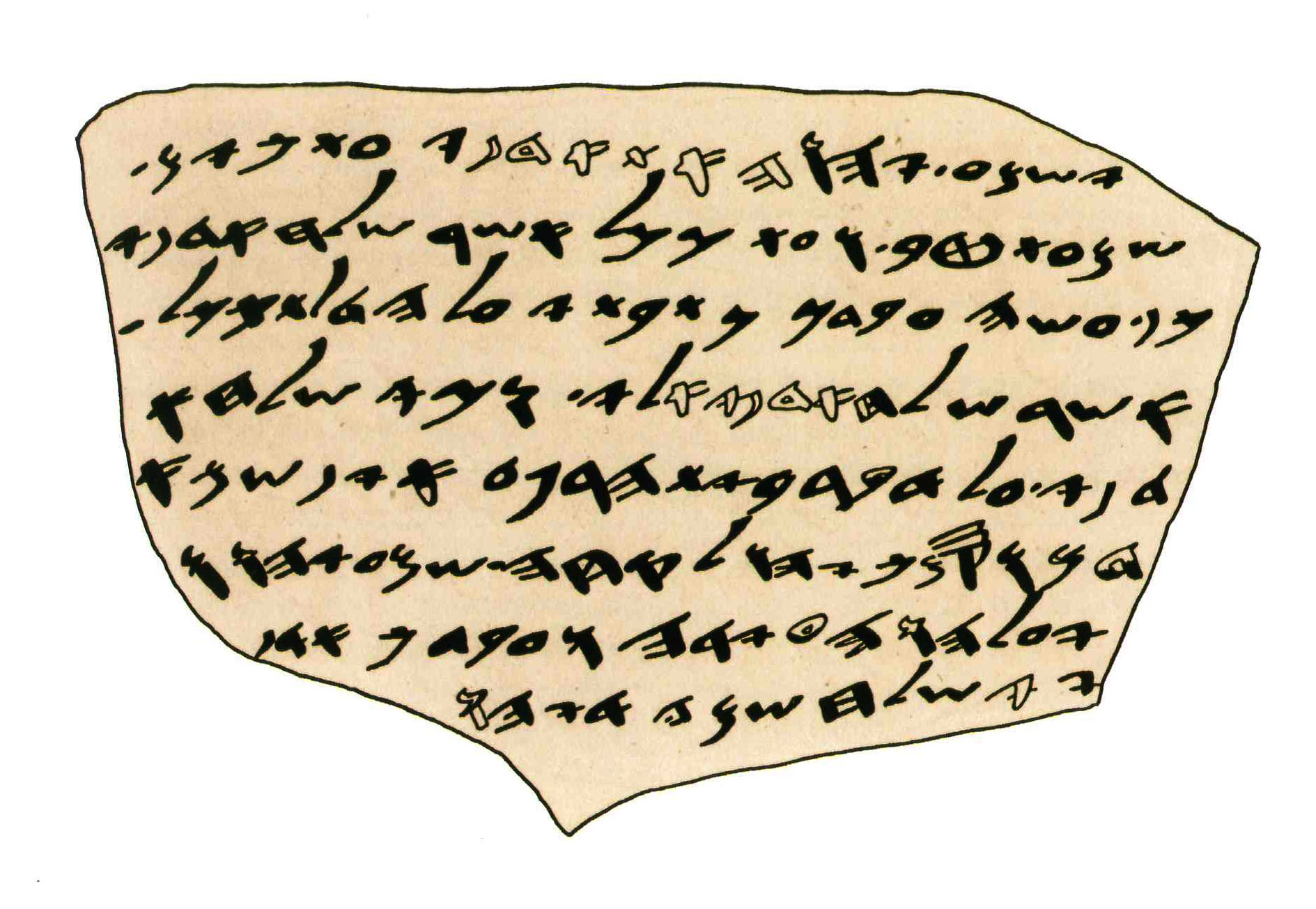
Israel Antiquities Authority
Hand copy from Lachish I, The Lachish Letters, H. Torczyner, 1938
The Babylonian Destruction of Lachish and Azekah, 588 BCE
Jeremiah 34:6-7
“Jeremiah the prophet relayed all these words to Zedekiah king of Judah …when the army of the king of Babylon was fighting against Jerusalem and against all the remaining cities of Judah, that is, Lachish and Azekah….”
The Lachish Ostracon 4
“…we are watching the Lachish (fire) signal according to the signs which my lord has given, because we do not see (the fire-signal from) Azekah.”
Pictured here is one of the twenty-two ostraca
that were discovered in Lachish, written in ancient Hebrew script.
In comparison to the cuneiform, the findings with written Hebraic text
of this period further prove the high degree of literacy amongst the Jews.
This letter reflects an atmosphere of imminent
danger imposed by the Babylonian forces, suggesting that Azekah, sixteen
kilometers north of Lachish, had already fallen to the Babylonians:
“…we
are watching the Lachish (fire) signal according to the signs which my lord has
given, because we do not see (the fire-signal from) Azekah.”
Jeremiah 34:6-7 verifies the story: “Jeremiah
the prophet relayed all these words to Zedekiah king of Judah …when the army of
the king of Babylon was fighting against Jerusalem and against all the
remaining cities of Judah, that is, Lachish and Azekah….”
A Letter to Arad from Jerusalem Referencing the Temple, c. 588 BCE
Arad Ostracon 18
To my lord Eliashib: May Y.H.V.H inquire after your well-being... And concerning the matter about which you commanded me, it is well. He is staying in the house of Y.H.V.H.
The Arad Ostracon no. 18 mentions the Temple in Jerusalem and the tetragrammaton name of G-d. It also mentions the distribution of food in Arad. To my lord, Eliashib: May the L-RD (spelled yud and hey and vav and hey) inquire after your well-being... And concerning the matter about which you commanded me, it is well. He is staying in the house of L-RD.
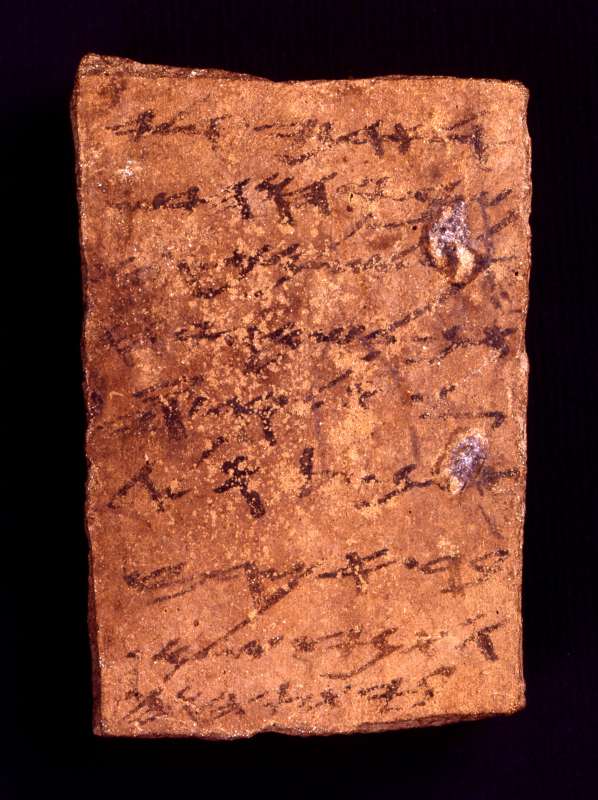
Israel Museum / Israel Antiquities Authority
The Edomites Attack Judea, c. 588 BCE
Ezekiel 35:5
Because you [Edom] harbored an ancient hatred and handed the people of Israel over to the sword in their time of calamity, the time set for their punishment—
Arad Ostracon 24
“...And the word of the king (Zedekiah) is incumbent upon you for your very life! Behold, I have sent to warn you [Eliashib] today: [Get] the men to Elisha: Lest Edom should come there (Ramat Negev).”
As the Babylonians attacked from the North,
Judah’s neighbor to the South, Edom, did not come to their aid.
The Prophet Obadiah portrays Edom as
treacherous, aligning with the Babylonians and encouraging the Babylonian
destruction of Judah.
Obadiah 1:14 You
[Edom] should not wait at the crossroads to cut down their fugitives, nor hand
over their survivors in the day of their trouble. From the Arad Fortress, the following warning
was preserved on
Arad Ostracon 24:
“...And
the word of the king (Zedekiah) is incumbent upon you for your very life!
Behold, I have sent to warn you [Eliashib] today: [Get] the men to Elisha: Lest
Edom should come there (Ramat Negev).”
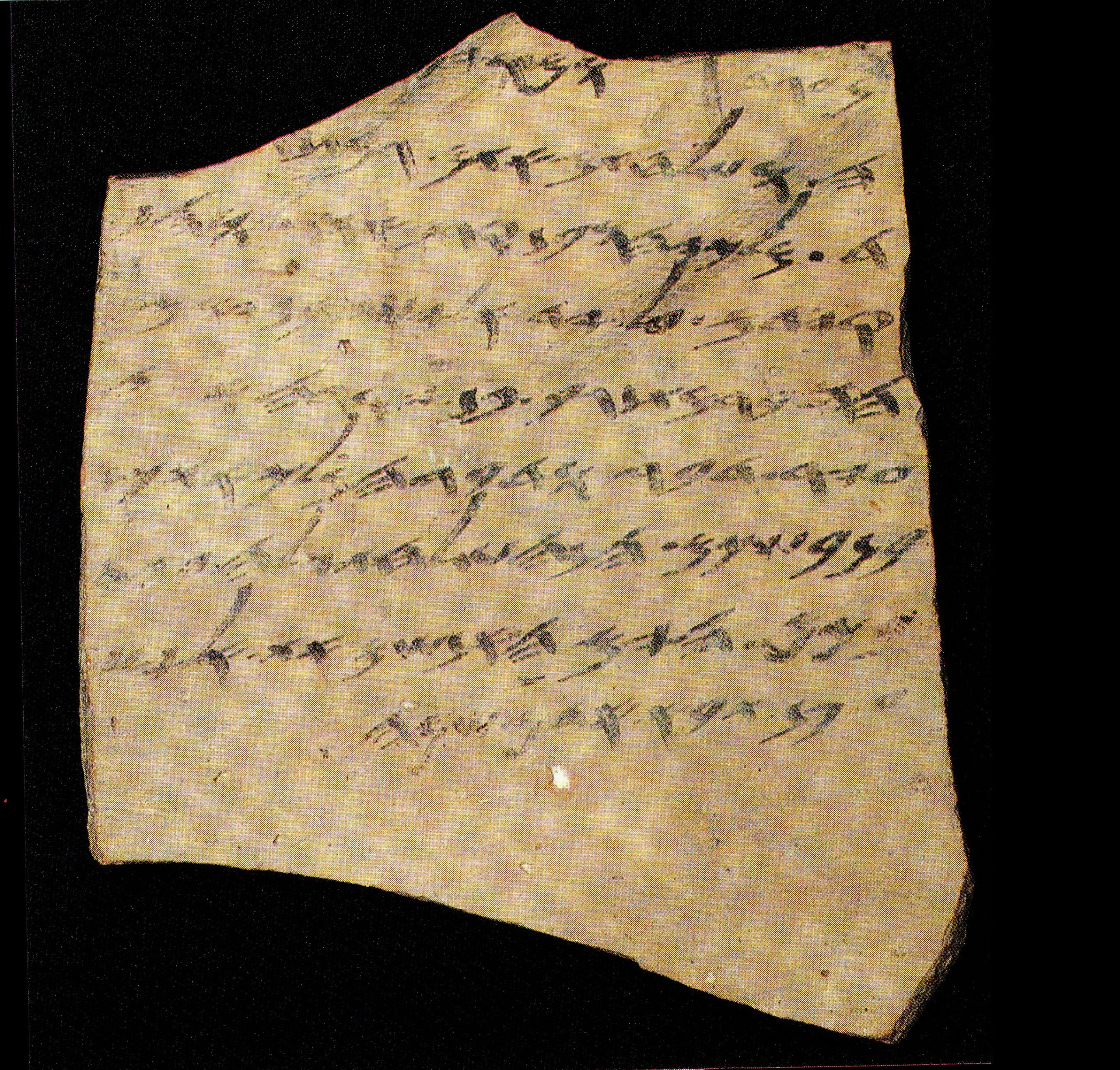
Israel Antiquities Authority / Israel Museum,
Photo by Zev Radovan

Head of an Edomite Goddess
This sculpture was unearthed at an Edomite shrine in the Negev. It is the only one of its kind ever revealed in Israel. The three horns indicate that it represents a goddess.
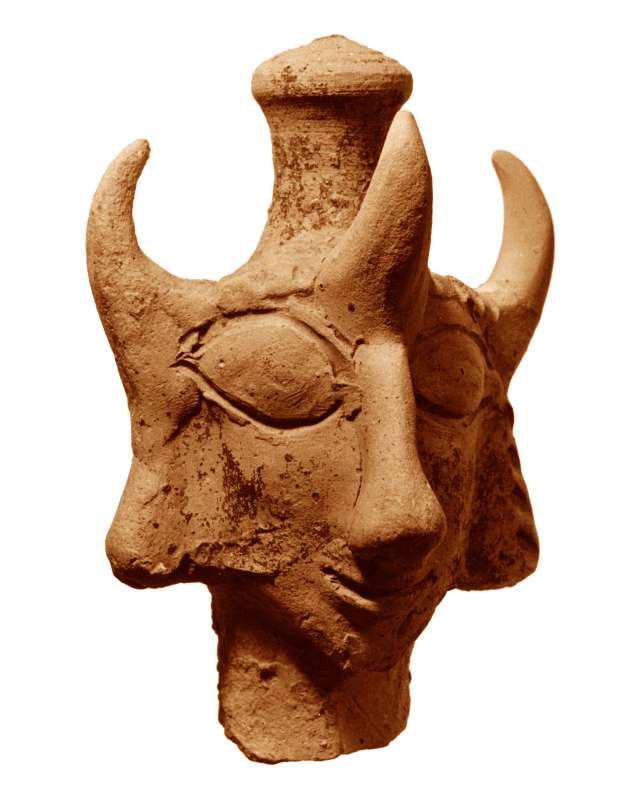
In this picture is the head of an Edomite goddess that was unearthed at an Edomite shrine in the Negev. It is the only one of its kind ever revealed in Israel. The three horns indicate that it represents a goddess.
Israel Antiquities Authority / Israel Museum
Egyptian Pharaoh Apries (also known as Hophra)
Jeremiah 37:5
The army of Pharaoh (Apries) had set out from Egypt; and when the Chaldeans who were besieging Jerusalem heard the report, they raised the siege of Jerusalem.
A stele of Egyptian Pharaoh Apries (r. 589–570 BCE) was found in 2011 at Tell Defenneh. Dating to the seventh year of the pharaoh's reign, 582 BCE, the stele reports that Egyptian forces marched east to confront Nebuchadnezzar's army. In 2021, an Egyptian farmer near the city of Ismailia discovered another Apries stele that appears to bear the same inscription.
Jeremiah writes about the Pharaoh coming to the aid of Jerusalem, however, ultimately, after the withdrawal of the Egyptian army, the Babylonians would return to attack Jerusalem.
Nebuchadnezzar’s forces were diverted when the Babylonians went to deal with the Egyptian army that was sent to help Judah by Pharaoh Apries. Jeremiah writes: The army of Pharaoh had set out from Egypt; and when the Chaldeans who were besieging Jerusalem heard the report, they raised the siege of Jerusalem. Two steles of Pharaoh Apries have been found in northeastern Egypt.
Biblical Archaeology Society, Photo by James K. Hoffmeier
King Zedekiah Permits Gedaliah and Jehuchal to Throw Jeremiah into the Pit
Jeremiah 38:3-6
“This is what the L-rd says: ‘This city will certainly be given into the hands of the army of the king of Babylon, who will capture it.’ ”
Then the officials (Gedaliah son of Pashhur, Jehuchal son of Shelemiah) said to the king (Zedekiah), “This man should be put to death…”
They lowered Jeremiah with ropes into the pit, which had no water but only mud, and Jeremiah sank down into the mud.
Jeremiah warned King Zedekiah that the aid
from Pharaoh’s army would only be temporary, and that the Babylonians would
return to take Jerusalem.
Jeremiah 38:3
“This
is what the L-RD says: ‘This city will certainly be given into the hands of the
army of the king of Babylon, who will capture it.’ ” The king’s officials feared that Jeremiah’s
prophecy would discourage warriors from fighting and weaken their forces. King Zedekiah permitted his officials to take
Jeremiah
and do with him what they saw fit.
Jeremiah 38:6
They
lowered Jeremiah with ropes into the pit, which had no water but only mud, and
Jeremiah sank down into the mud. At the City of David, a large ancient cistern
was discovered. Its proximity to the
ancient governmental area of Jerusalem suggests that it might have been the pit
that Jeremiah was lowered into.
The City of David Excavations
Seal of “Yehuchal Son of Shelemiah”
Jeremiah 38:1
Now Shephatiah son of Mattan, Gedaliah son of Pashhur, Jehuchal son of Shelemiah, and Pashhur son of Malchijah heard that Jeremiah had been telling all the people…
During excavations from 2005 to 2008 in the
City of David, archaeologist Eilat Mazar discovered seal impressions or bullae
containing the names of the officials from the Book of Jeremiah.
This bulla reads: “Belonging to Yehuchal son of Shelemyahu.”
In chapter 37 Jehuchal son of Shelemiah initially went to inquire of Jeremiah.
When Jeremiah's prophecy was deemed too dark, Jehucal and other officials
conspired to have Jeremiah killed.
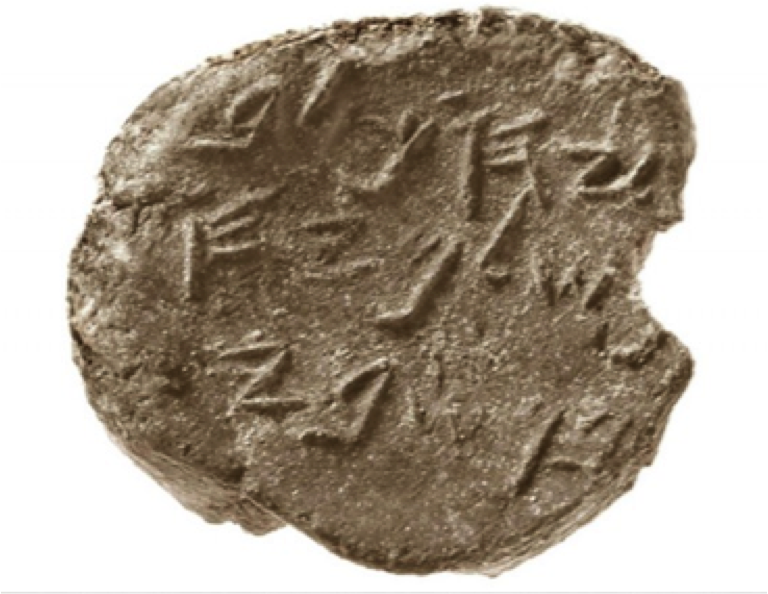
City of David Excavations /
Israel Antiquities Authority

City of David Excavations / Israel Antiquities Authority
Seal of “Gedaliah Son of Pashhur”
Jeremiah 38:1
Now Shephatiah son of Mattan, Gedaliah son of Pashhur, Jehuchal son of Shelemiah, and Pashhur son of Malchijah heard that Jeremiah had been telling all the people...
Another official that Jeremiah names as a conspirator is “Gedaliah son of Pashhur.”
Jeremiah 38:1
and 6 Now
Shephatiah son of Mattan, Gedaliah son of Pashhur, Jehuchal son of Shelemiah,
and Pashhur son of Malchijah heard that Jeremiah had been telling all the
people…Then they took Jeremiah, and cast him into the pit…
In the same
excavation, this bulla bearing the name “Gedaliah Son of Pashhur” was
discovered at the City of David.
King Zedekiah tries
to Escape
Jeremiah 39:4-5
When King Zedekiah of Judah saw them, he and all the soldiers fled. They left the city at night, by way of the king’s garden, through the gate between the double walls; and he set out toward the Arabah. But the Chaldean troops pursued them, and they overtook Zedekiah in the steppes of Jericho. They captured him and brought him before King Nebuchadrezzar of Babylon at Riblah in the region of Hamath; and he put him on trial.
Jeremiah 39:1-2 In the
ninth year of Zedekiah king of Judah, in the tenth month, Nebuchadnezzar king
of Babylon marched against Jerusalem with his entire army and laid siege to the
city. And on the ninth day of the fourth month of Zedekiah’s eleventh year, the
city was breached.
Jeremiah's words of warning became a harsh
reality.
The Bible tells of Zedekiah fleeing the
city.
Many legends and traditions
believe that he tried to escape through a secret tunnel that leads to the Dead
Sea known today as Zedekiah’s Cave, located on the outskirts of the Old City.
Zedekiah's Cave Under the Temple Mount, Jerusalem
Wikimedia Commons

The British Museum, London
Name of a Babylonian Official Mentioned in the Bible Found on a Cuneiform Tablet
Jeremiah 39:3
Then all the officials of the king of Babylon entered and sat in the Middle Gate: Nergal-sharezer of Samgar, Nebo-sarsekim (Sarsechim) the Rabsaris, Nergal-sharezer the Rabmag, and all the rest of the officials of the king of Babylon.
Nebosarsekim Tablet
This receipt from Sippar reports that Nebosarsekim delivered 1.5 mina of gold to Marduk's temple in 594 BCE.
The name “Nebosarsekim” was found in this
Babylonian cuneiform inscription.
According to the Book of Jeremiah, Nebosarsekim was one of the head
officers who entered Jerusalem when the walls were breached.
Jeremiah 39:3 Then
all the officials of the king of Babylon came and sat in the Middle Gate:
Nergal-sharezer of Samgar, Nebo-sarsekim the Rabsaris, Nergal-sharezer the Rabmag, and all the rest
of the officials of the king of Babylon.
King Zedekiah Is Blinded by the Babylonians,
587 BCE
Jeremiah 39:6-7
The king of Babylon had Zedekiah’s children slaughtered at Riblah before his eyes; the king of Babylon had all the nobles of Judah slaughtered. Then the eyes of Zedekiah were put out and he was chained in bronze fetters, that he might be brought to Babylon.
When Zedekiah was captured by the pursuing
Babylonian army, a grim fate awaited him.
Jeremiah 39:6-8 The
king of Babylon had Zedekiah’s children slaughtered at Riblah before his eyes;
the king of Babylon had all the nobles of Judah slaughtered. Then the eyes of
Zedekiah were put out and he was chained in bronze fetters, that he might be
brought to Babylon.
Pictured is the slaughter of the sons of Zedekiah before
their father by Gustave Dore
The Slaughter of the Sons of Zedekiah Before their Father, Gustave Doré, 1870, Green Family Collection, Photo by Ardon Bar-Hama
The Babylonian Destruction of King Solomon’s Temple, 586 BCE
Jeremiah 52:12-13
Now on the tenth day of the fifth month, which was the nineteenth year of King Nebuchadnezzar ( 586 BCE), king of Babylon, Nebuzaradan the captain of the bodyguard, who was in the service of the king of Babylon, came to Jerusalem. He burned the house of the L-RD, the king’s house and all the houses of Jerusalem; even every large house he burned with fire.
Jeremiah 39:8 The
Chaldeans (i.e. the Babylonians) burned down the king’s palace and the houses
of the people by fire, and they tore down the walls of Jerusalem.
This video by the Megalim Institute shows the
archaeological findings that confirm the destruction of Jerusalem and the First
Temple by the Babylonians.
City of David Megalim Institute, Courtesy of George Blumenthal and the Gol Family
Ba'alis, King of Ammon
Jeremiah 40:13-14
…and all the commanders of the armies in the field came to Gedaliah at Mizpah and said to him, "Are you aware that Baalis king of the Ammonites has sent Ishmael son of Nethaniah to take your life?"
Seal of Ba’alis
“[Belonging to] Ba‘alis.” The word “king” flanks the winged sphinx at center, while the bottom line contains the partial phrase “Sons of Ammon.”
After conquering Jerusalem, the Babylonians made Gedaliah, a member of a prominent Jerusalem family, governor of Judah. But he was soon murdered, an event still commemorated in Jewish tradition as one of the four major fasts mentioned in Zechariah 8:19. The assassin was sent by Ba'alis, King of the Ammonites.
Jeremiah
40:13-14 …and all the commanders of the armies in the
field came to Gedaliah at Mizpah and said to him, "Are you aware that
Baalis king of the Ammonites has sent Ishmael son of Nethaniah to take your
life?"
Ba'alis's
seal is made of brown agate with a white band that reads:
“[Belonging
to] Ba‘alis.” The word “king” flanks the winged sphinx at the center, while the
bottom line contains the partial phrase “Sons of Ammon.”
Photo by Robert Deutsch
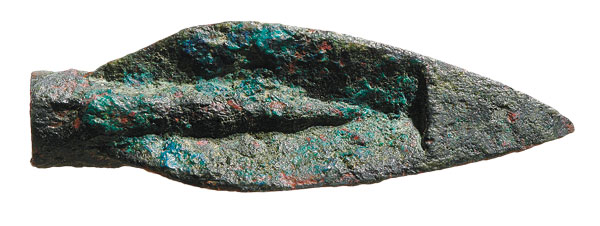
A copper Babylonian arrowhead of the kind used by Nebuchadnezzar’s army,
found in the soil of the Temple Mount, Temple Mount Sifting Project
Babylonian Arrowhead from the Destruction of the Temple in 586 BCE
2 Chronicles 36:18-20
All the vessels of the House of G-d, large and small, and the treasures of the House of the L-RD and the treasures of the king and his officers were all brought to Babylon.
They burned the House of G-d and tore down the wall of Jerusalem, burned down all its mansions, and consigned all its precious objects to destruction.
Those who survived the sword he exiled to Babylon, and they became his and his sons’ servants till the rise of the Persian kingdom.
A Babylonian arrowhead from the destruction of the Temple in 586 BCE was found at the Temple Mount Sifting Project. A Scythian-type arrowhead that was used by the Babylonians is distinguished from other arrowheads by its three triangular fins and a hollow socket into which a shaft was inserted.
Ashes from "Ahiel's House,"
Burnt by the Babylonians in 586 BCE
2 Kings 25:9
He burned the House of G-D, the king’s palace, and all the houses of Jerusalem; he burned down the house of every notable person.
A weighing stone and ostracon were found at the site with the name "Ahiel" on it.
Ahiel Ostracon
The name "Ahiel" was found on broken pottery in the destruction layer in Area G of the City of David, near the Temple Mount. The script reads "belonging to...Ahi'el Ahi'el..."
The ruins of a prominent house built into the
eastern stepped-stone structure of the palace area at the City of David remain
as evidence of the Babylonian destruction. A weighing stone with the name
"Ahiel" etched on it suggests with high probability the name of the
owner of the house.
2 Kings 25:9 He
burned the House of G-d, the king’s palace, and all the houses of Jerusalem; he
burned down the house of every notable person.
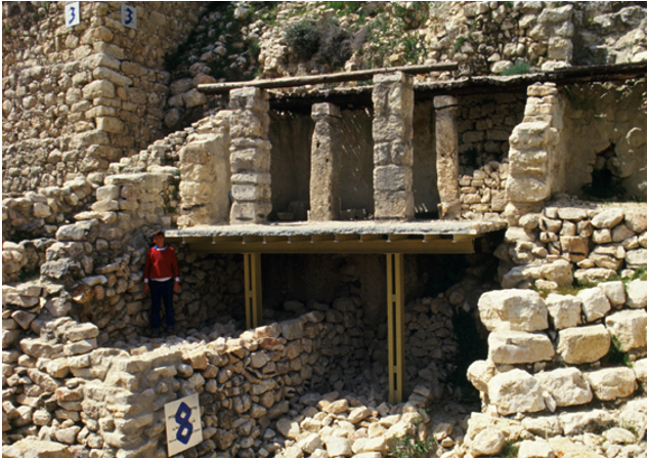
The City of David
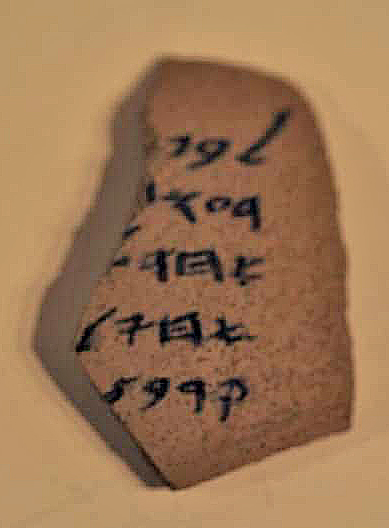
Replica, the Mandain Project
Gary Lipton, Biblical Archaeology Society
Storage Jar from the Babylonian Destruction Layer
Found in the destruction layer of 587 BCE, this storage jar bears the inscription "Belonging to the daughter of Ya'ama, (wine of) good (quality)."
Found in the destruction layer of 587 BCE, this storage jar bears the inscription "Belonging to the daughter of Ya'ama, (wine of) good (quality)."
Institute of Archaeology at the Hebrew University of Jerusalem. Photo by Ardon Bar-Hama
Jeremiah Lamenting the Destruction of Jerusalem
by Rembrandt
Lamentations 1:1-3
How lonely sits the city
That was full of people!
She has become like a widow…
Judah has gone into exile…
The Rijksmuseum is home to Rembrandt’s
depiction of Jeremiah lamenting the destruction of Jerusalem. Despondently, with head in hands, the prophet
weeps with Jerusalem burning in the background.
His elbow rests on a large book which is inscribed 'Bibel' on the edge
of the pages.
How
lonely sits the city That was full of people! She has become like a widow…
Judah has gone into exile… (Lamentations 1:1-3)
Rijksmuseum, Amsterdam,
Photo by Ardon Bar-Hama
Israel Antiquities Authority
Photo by Shai Halevi
Lamentation Scroll
Lamentations 1:3
Judah has gone into exile
Because of misery and harsh oppression;
When she settled among the nations,
She found no rest;
All her pursuers overtook her
In the narrow places.
Lamentation Scroll from the Dead Sea Scrolls, 1st Century CE
Pictured is a fragment of the earliest known attestation of the Book of Lamentations, written on a parchment in Hebrew and discovered in the Qumran caves.
Pictured is a fragment of the earliest known attestation of the Book of Lamentations, dated to the First Century CE. It is written on a parchment in Hebrew and was discovered along with other Dead Sea Scrolls in the caves of Qumran.
Nebuchadnezzr Releases Jeremiah, Gedaliah is Assassinated
Jeremiah 39:11-14
King Nebuchadnezzar of Babylon had given orders to Nebuzaradan, the chief of the guards, concerning Jeremiah:“Take him and look after him; do him no harm, but grant whatever he asks of you.... They committed him to the care of Gedaliah...
Jeremiah 41:1-2
In the seventh month, Ishmael son of Nethaniah... and the ten men who were with him arose and struck down Gedaliah...
When the Babylonians laid siege to Jerusalem,
Nebuchadnezzar ordered his guards not to harm Jeremiah, and he was put into the
care of Gedaliah, the governor...
Jeremiah 40:6 So
Jeremiah came to Gedaliah son of Ahikam at Mizpah, and stayed with him among
the people who were left in the land.
However, not long after, Gedaliah was assassinated,
prompting those who were left in the land to flee to Egypt.
Michelangelo, The Sistine Chapel
Israelites Flee to Egypt,
586 BCE
Jeremiah 43:5-7
Instead, Johanan son of Kareah and all the army officers took the entire remnant of Judah... men, women, and children; and the daughters of the king and all the people whom Nebuzaradan the chief of the guards had left with Gedaliah son of Ahikam son of Shaphan, as well as the prophet Jeremiah and Baruch son of Neriah—and they went to Egypt.
Papyrus Amherst 63
Found in Luxor (ancient Thebes), Egypt, near the island of Elephantine
“I come from Judah; my brother has been brought from Samaria; and now, a man is bringing up my sister from Jerusalem.”
The Jews fled to Egypt, against the warning of Jeremiah. Jeremiah
43:5-7 The army officers… took the entire remnant of
Judah... as well as
the prophet Jeremiah… and they went to Egypt.
The
Papyrus Amherst number 63 that was found in Luxor or ancient Thebes in Egypt,
near the island of Elephantine. This text contains documentation of people
coming to Egypt from Judah.
“I come from Judah; my brother has been brought from
Samaria; and now, a man is bringing up my sister from Jerusalem.”
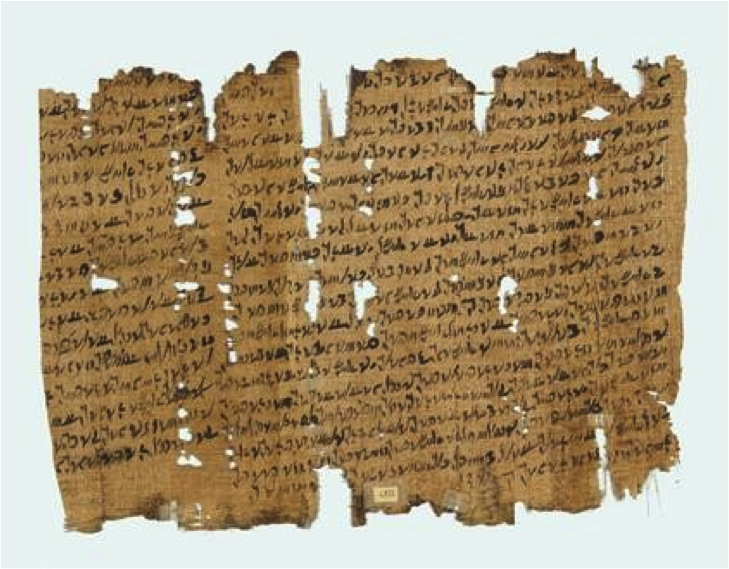
Papyrus Written in Egyptian Cursive Script
The Morgan Library, New York
Jeremiah in Egypt
Jeremiah 43:8
And the word of G-D came to Jeremiah in Tahpanhes...
Jeremiah's route traveling to Egypt.
Here is the route thatJeremiah traveled to Egypt. While in Egypt, Jeremiah continued to prophesy the word of G-d.
Jeremiah
44:1-2 The word that came to Jeremiah for all the
Judeans living in the land of Egypt, living in Migdol, Tahpanhes, and Noph, and
in the land of Pathros: Thus said G-d of
Hosts, the G-d of Israel: You have seen all the disaster that I brought on
Jerusalem and on all the towns of Judah. They are a ruin today, and no one
inhabits them…
Biblical Archaeology Society
Exiled Israelites in Elephantine, Egypt
Elephantine Temple Papyrus
“Now our forefathers built this temple in the fortress of Elephantine back in the days of the kingdom of Egypt, and when Cambyses came to Egypt (c. 525 BCE) he found it built."
The Elephantine papyri documents the daily life of a Jewish colony in southern Egypt. The papyri, written in Aramaic, date to the 5th century BCE, when the Persian Empire dominated the Ancient Near East.
According to its content a Jewish community and local temple had already
been established at Elephantine long before the Persians came to power.
Elephantine Temple Papyrus “Now our forefathers built this temple in the
fortress of Elephantine back in the days of the kingdom of Egypt, and when
Cambyses came to Egypt (c. 525 BCE) he found it built."
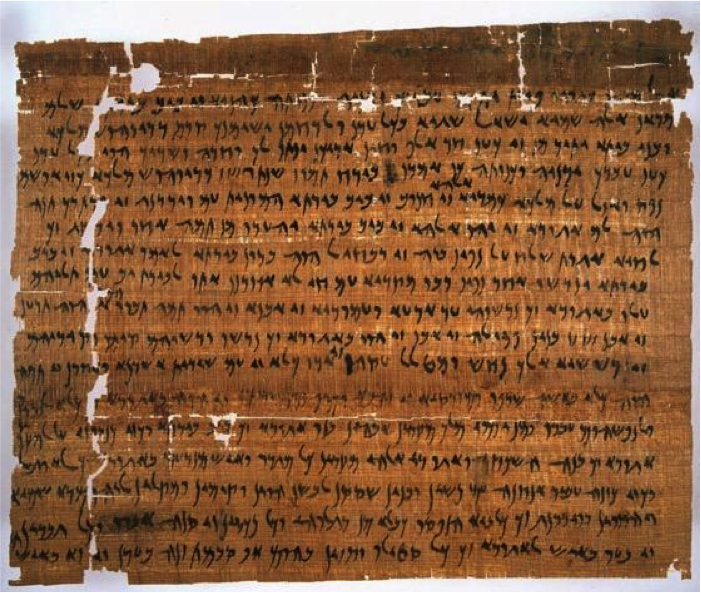
The Pergamon Museum, Berlin
Photo by Bruce and Kenneth Zuckerman, USC West Semitic Research Project
The Tower of Babylon
Jeremiah 50:14-15
Line up in formation around Babylon…Raise a war cry against her on every side!She has thrown up her hands in surrender; her towers have fallen...
The ruins of Etemenanki, the ziggurat of Ur, partially reconstructed today, said to have inspired the Tower of Babel story in the book of Genesis.
The word that the L-RD spoke through Jeremiah
also pronounced the Fall of Babylon.
Jeremiah 50:14-15 Line up in formation around Babylon…Raise a war cry against her on every side!She has thrown up her hands in surrender;her towers have fallen
Pictured are the ruins of Etemenanki, a ziggurat in the
ancient city of Babylon which the exiled Judeans would have seen while in
Babylon. It bears great resemblance to the
description of the Tower of Babel as mentioned in the book of Genesis.
Photo by Asaad Niazi, Getty Images
The Prophet Ezekiel, 592 BCE
Ezekiel 1:1
In the thirtieth year, on the fifth day of the fourth month, when I was in the community of exiles by the Chebar Canal, the heavens opened and I saw visions of G-d.
The prophet Ezekiel was born in the Land of
Israel. When Nebuchadnezzar conquered Jerusalem and exiled King Jehoiachin to
Babylon, Ezekiel was among the captives.
Ezekiel
1:1 In the thirtieth year, on the fifth day of the fourth
month, when I was in the community of exiles by the Chebar Canal, the heavens
opened and I saw visions of G-d.
The Prophet Ezekiel by Michelangelo
The Sistine Chapel
Shlomo Moussaieff Collection / Israel Antiquities Authority, Photo by Moshe Caine
The Bible Lands Museum, Jerusalem
Ezekiel and The Chebar River of Babylon
Ezekiel 1:2-3
On the fifth day of the month—it was the fifth year of the exile of King Jehoiachin—the word of the L-RD came to the priest Ezekiel son of Buzi, by the Chebar Canal, in the land of the Chaldeans.
Clay Tablet mentioning the Chebar River
"(written in a) city (on) the Chebar River..."
The map shows in orange the region of Babylonia settled by the Judean exiles.
This clay tablet dates back to the time of the Babylonian Exile. It mentions the Chebar River, the location Ezekiel specified, in the fifth line of the inscription.
Ezekiel in Tel Abib
c. 592 BCE
Ezekiel 3:15
And I came to the exile community that dwelt in Tel Abib by the Chebar Canal, and I remained where they dwelt.
This cuneiform tablet was written in the city of Til-Abubi, in modern day southern Iraq. This place, whose meaning in the Akkadian language is "ruin mound from the flood," was also mentioned by the prophet Ezekiel. This is the source of the name for the modern city of Tel-Aviv.
Ezekiel 3:15
And I came to the exile community that dwelt
in Tel Abib by the Chebar Canal, and I remained where they dwelt.
This
cuneiform tablet was written in the city of Til-Abubi which in the Akkadian
language means "ruin mound of the flood." This was the source of the
name of modern-day Tel Aviv in Israel. The Hebrew word “Aviv” means spring or
renewal, which marks a new beginning.

Iraq Museum, Baghdad, Hand copy from Ur Excavations Texts IV, HH. Figulla, 1949, no. 111.
Psalm 137
By the rivers of Babylon,
there we sat,
sat and wept,
as we thought of Zion.
Pictured is the Dead Sea Scrolls Psalms Scroll
fragment.
Psalm 137
By the
rivers of Babylon,
there
we sat,
sat
and wept,
as we remembered
Zion.
The Dead Sea Scrolls Psalms Scroll Fragment
Israel Antiquities Authority, Photo by Ardon Bar-Hama
Israelites Are Exiled to Babylon
2 Kings 24:14-16
“He carried into exile all Jerusalem… The king of Babylon also brought into exile to Babylon all seven thousand men of valor and a thousand craftsmen and metalsmiths—all strong and fit for battle.”
In 2016, The Bible Lands Museum, Jerusalem
exhibited “By the Rivers of Babylon,” displaying archaeological artifacts from
the time of the Babylonian exile.
You
can view this exhibit as it was presented in the museum through this virtual
tour utilizing photography by Ardon Bar-Hama.
Al-Yahudu Archive
By The Rivers of Babylon, Bible Lands Museum Jerusalem
Photography and Virtual Exhibit by Ardon Bar-Hama
The Al-Yahudu Tablets Document Exiled Judeans in Babylon
The Al-Yahudu Archive is a collection of about 200 clay tablets from the 6th and 5th centuries BCE that document life of the exiled Judean community in Babylonia following the destruction of the First Temple.
A collection of about 200 clay tablets from the sixth and fifth centuries BCE documents life of the exiled Judean community in Babylonia following the destruction of the First Temple. These tablets are known as the Al-Yahudu Archive. In this video, Amanda Weiss, Director of the Bible Lands Museum Jerusalem, explains the significance of the Al-Yahudu tablets. We will examine a few of these tablets more closely as we move forward.
Amanda Weiss, Director of the
Bible Lands Museum Jerusalem
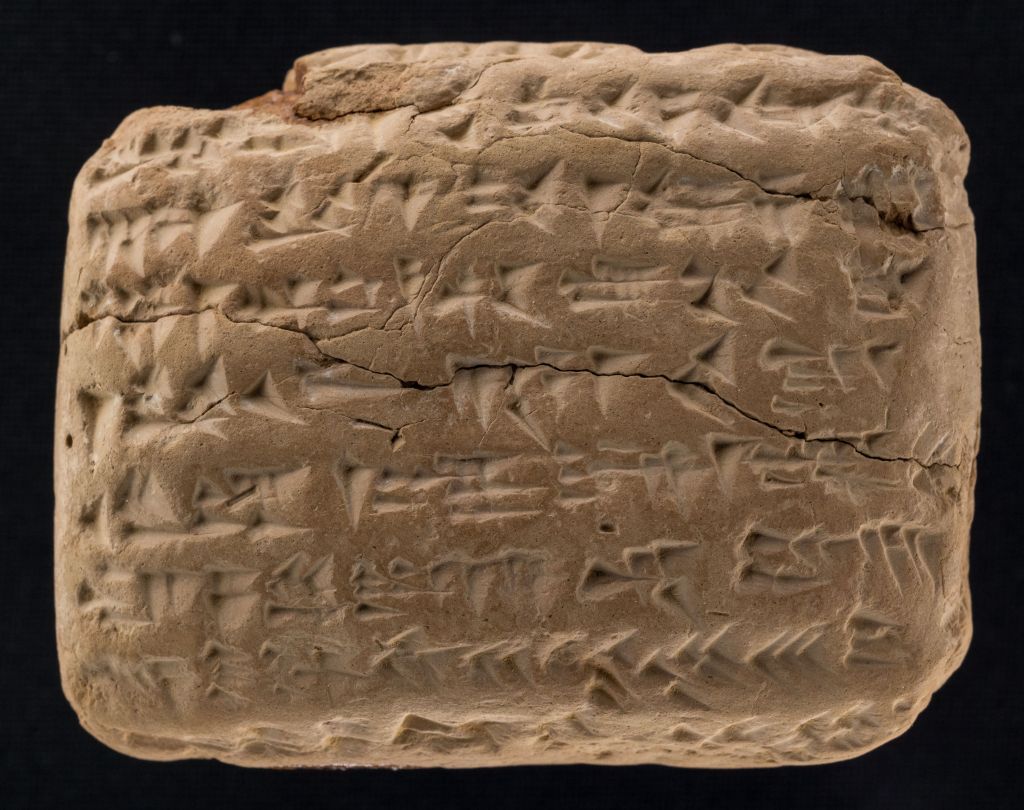
Collection of David Sofer,
Photo by Ardon Bar-Hama
Exiled Judeans in Babylonia, 572 BCE
This is the earliest known text documenting the exiled Judeans of Babylonia, who can be recognized by their personal names. The tablet was written in Al-Yahudu (City of Judah), referred to in this text as Al-Yahudaia (City of the Judeans) less than 15 years after the exile of 587 BCE. The tablet reads:
"(Written in ) Al-Yahudaia, on the 20th day of Nissan, year 33 of Nebuchadnezzar, King of Babylon"
From the Al-Yahudu archive, this tablet references “Al-Yahudaia,” meaning “City of the Judeans.” It was written less than 15 years after the exile of 587 BCE. The tablet reads:
"(Written in ) Al-Yahudaia, on the 20th day of Nissan, year 33 of Nebuchadnezzar, King of Babylon"
Exiled Judeans in Babylonia, 551 BCE
Inscribed in Paleo-Hebrew
"(x) liters of barley are owed to Gummulu son of Bi-hame, by Shalam-Yama son of Nadab-Yama.”
Here is an example of an agreement written in Paleo-Hebrew by exiled Judeans in Babylonia. The tablet specifies an amount of barley is owed to Gummulu son of Bi-hame, by Shalam-Yama son of Nadab-Yama.

Israel Antiquities Authority

Pergamon Museum, Berlin
King Jehoiachin is Freed in Babylon, c. 560 BCE
Jeremiah 52:31, 34
And in the thirty-seventh year of the exile of Jehoiachin king of Judah… Evil-merodach king of Babylon, in the year that he began to reign, graciously freed Jehoiachin king of Judah and brought him out of prison…. and for his (Jehoiachin’s) allowance, a regular allowance was given him by the king… until the day of his death, as long as he lived.
Babylonian Ration Tablet
“10 liters (of oil) to Jehoiachin, king of Judah, 2.5 liters for the 5 sons of the king of Judah...”
The Bible relates that King Jehoiachin was released by King Evil Merodach who succeeded his father Nebuchadnezzar II.
Jeremiah 52:31, 34
And in the thirty-seventh year of the exile of Jehoiachin king of Judah… Evil-merodach king of Babylon, in the year that he began to reign, graciously freed Jehoiachin king of Judah and brought him out of prison…. and for his (Jehoiachin’s) allowance, a regular allowance was given him by the king… until the day of his death, as long as he lived.
The rations for King Jehoiachin while he was imprisoned in Babylon are recorded on this tablet which reads:
“10 liters (of oil) to Jehoiachin, king of Judah, 2.5 liters for the five sons of the king of Judah...”

The British Museum, London
Photo by Ardon Bar-Hama
Nabonidus, the Last King of the Babylonian Empire
r. 556–539 BCE
Nabonidus Cylinder
”And as for Belshazzar my firstborn son, my own child, let the fear of your great divinity be in his heart…”
Nabonidus was the Last King of the Babylonian Empire, reigning from 556 to 539 BCE.
During a period of his reign, his son Belshazzar acted as regent.
The Nabonidus Cylinder that was excavated in 1854 from the foundation of a ziggurat at Ur, states,
”And as for Belshazzar my firstborn son, my own child, let the fear of your great divinity be in his heart…”
The Writing Is on the Wall:
"...your kingdom is given to the Medes and Persians"
Daniel 5:1, 5
King Belshazzar gave a great banquet for a thousand of his nobles and drank wine with them…
Suddenly the fingers of a human hand appeared and wrote on the plaster of the wall, near the lampstand in the royal palace.
The Bible depicts Belshazzar as an arrogant ruler. He ordered the sacred Temple vessels to be brought to his palace for a gala banquet, and he profaned them by using them as common drinking cups, toasting and praising his pagan gods. At the banquet, Daniel relates in Chapter 5 verses 5 and 6:
Suddenly the fingers of a human hand appeared and wrote on the plaster of the wall, near the lampstand in the royal palace. The king’s face darkened, and his thoughts alarmed him; the joints of his loins were loosened and his knees knocked together.
The writing was on the wall for Belshazzar.
Daniel interpreted the cryptic message for him:
Mene Mene Tekel Upharsin
G-d has numbered your days, you have been weighed and found wanting, your kingdom will be divided and given to the Medes and the Persians
Belshazzar's Feast by Rembrandt, National Gallery, London
The Babylonian Exile and the Edict of King Cyrus
City of David Megalim Institute, Courtesy of George Blumenthal and the Gol Family
As the Babylonian Empire fell to Persian rule, radical changes swept through the land including an edict by the new ruler Cyrus the Great that made the hope of returning to Zion possible again. Watch this video by the Megallim Institute taking us through the Babylonian exile to the edict of King Cyrus and the subsequent Return to Zion.
Cyrus Captures Babylon:
The Persian Rule of Judah Begins, 539 BCE
Jeremiah 51:56
A destroyer will come against Babylon; her warriors will be captured, and their bows will be broken.
Nabonidus Chronicle
“The army of Cyrus…entered Babylon. Afterwards, after Nabonidus retreated, he was captured in Babylon.”
As Jeremiah predicts in chapter 51 verse 56:
A
destroyer will come against Babylon; her warriors will be captured, and their
bows will be broken.
The Nabonidus Chronicle records the events
during the rule of Nabonidus. In 539
BCE, King Cyrus of Persia conquered the Babylonian Empire.
The chronicle reads: “The army of
Cyrus…entered Babylon. Afterward, after Nabonidus retreated, he was captured in
Babylon.”
The British Museum, London, Photo by Ardon Bar-Hama
The Ishtar Gate, 575 BCE
The Ishtar Gate was the eighth gate to the inner city of Babylon. It was constructed in about 575 BCE by order of King Nebuchadnezzar II on the north side of the city.
Babylon’s dominion would come to an end. The Persians, led by Cyrus, likely entered Babylon through the gate of Ishtar, the most prominent gate, which Nebuchadnezzar built and dedicated to the goddess Ishtar. It was one of the eight gates of the inner city of Babylon constructed around 575 BCE on the north side of the city. The gateway was completely covered with beautifully glazed bricks of glorious blue surrounded by brightly colored yellow and brown beasts.
Pergamon Museum, Berlin, Photos by Ardon Bar-Hama
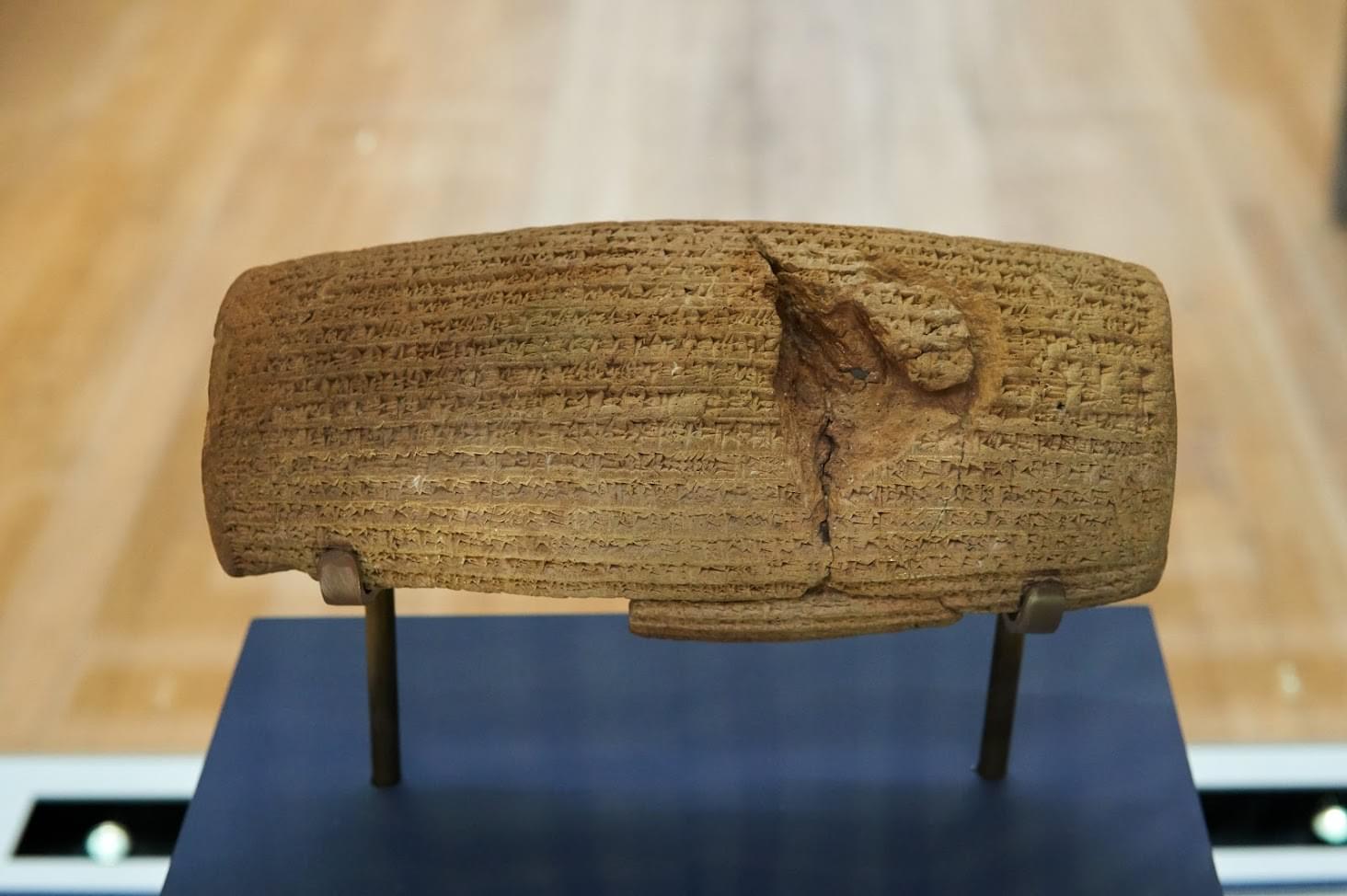
The British Museum, London
Photo by Ardon Bar-Hama
Cyrus's earlier aid to the exiled priests of Marduk during Nabonidus’ reign, gained their support to later assist him in dethroning Nabonidus in a peaceful transition.
Cyrus chose to turn this success into a larger strategy allowing local residents to return to their ancestral ground and freely practice their religions under his reign. This policy is recorded in what is known as the Cyrus Cylinder discovered in 1879 during excavations in Babylon and reads as follows:
“I Cyrus returned the [images of] the gods to the sacred centers . . . I gathered all their inhabitants and returned [to them] their dwellings.”
As part of this King Cyrus allowed the exiled Judeans to return to Jerusalem and rebuild the Temple in 539 BCE.
Ezra 5:13-15
King Cyrus of Persia, in the first year of his reign, made a decree that the House of G-d should be rebuilt (in Jerusalem) . . .
Ezra 5:13
King Cyrus of Persia, in the first year of his reign made a decree that the house of G-d should be rebuilt (in Jerusalem) . . .
Cyrus Cylinder
“I Cyrus returned the [images of] the gods to the sacred centers . . . I gathered all their inhabitants and returned [to them] their dwellings.”
King Cyrus Allows Exiled Judeans to Return to Jerusalem and Rebuild the Temple, 539 BCE
Persian Governor Tattenai's Inquiry on the Rebuilding of the Temple, c. 520 BCE
Ezra 5:3
At once Tattenai, governor of the province of Beyond the River, Shethar-bozenai, and their colleagues descended upon them and said this to them, “Who issued orders to you to rebuild this house and complete its furnishing?”
Jerusalem, as part of the Persian Empire, lay in an area that the Persians called Across-the-River, to the west of the Euphrates.
After the Cyrus edict, Jews returning home to rebuild the temple were met with fierce political resistance. Those resisting the project turned maliciously to Tattenai, the governor of the region, trying to convince him to stop the project.
Ezra 5:3
At once Tattenai, governor of the province of Beyond the River, Shethar-bozenai, and their colleagues descended upon them and said this to them, “Who issued orders to you to rebuild this house and complete its furnishing?”
Confirmation of Tattenai political position has been found on a cuneiform tablet in the Tattannu Fragment Archive. The tablet is a promissory note dated to the 20th year of Darius I (502 BCE).
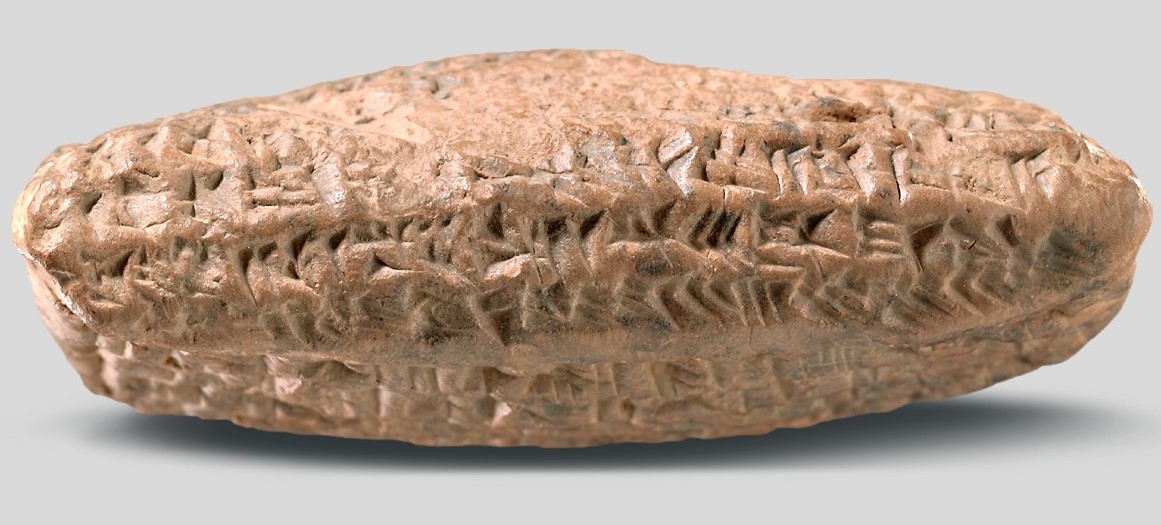
Vorderasiatisches Museum, Berlin, Photo by Olaf M. Tessmer
Confirmation of the Persian Governor of Tattenai from the province of Beyond the River has been found on a cuneiform tablet in the Tattannu Fragment Archive. The tablet is a promissory note dated to the 20th year of Darius I (502 BCE).
Darius I, The Great, Allows the Rebuilding of the Temple to Continue, c. 520 BCE
Ezra 6:6-8
King Darius decreed: "Now you, Tattenai, governor of the province of Beyond the River, Shethar-bozenai and colleagues, the officials of the province of Beyond the River, stay away from that place. Allow the work of this House of G-d to go on; let the governor of the Jews and the elders of the Jews rebuild this House of G-d on its site. And I hereby issue an order concerning what you must do to help these elders of the Jews rebuild this House of G-d..."
The Behistun Inscription was carved on a cliff during the reign of Darius I (r. 522–486 BCE). It features a bas-relief depiction of Darius over figures representing conquered peoples.
Tattenai wrote to Darius inquiring about the validity of the Jewish claim to rebuild the temple. The reply from Babylon comes by a decree from Darius himself:
Ezra 6:6-8
King Darius decreed: "Now you, Tattenai, governor of the province of Beyond the River, Shethar-bozenai and colleagues, the officials of the province of Beyond the River, stay away from that place. Allow the work of this House of G-d to go on; let the governor of the Jews and the elders of the Jews rebuild this House of G-d on its site. And I hereby issue an order concerning what you must do to help these elders of the Jews rebuild this House of G-d..."
You are looking at the Behistun Inscription that was carved on a cliff during the reign of Darius I who ruled from 522–486 BCE. It features a bas-relief depiction of Darius over figures representing conquered peoples.
Wikimedia Commons
The Temple is Complete and Passover is Celebrated, 515 BCE
Ezra 6:15, 19
The house was finished on the third of the month of Adar in the sixth year of the reign of King Darius.
The returned exiles celebrated the Passover on the fourteenth day of the first month
The Temple was completed in 515 BCE.
Ezra 6:15
The House was finished on the third day of the month Adar, which was in the sixth year of the reign of Darius the king.
A month and a half later they were able again to celebrate Passover.
Ezra 6:19
The returned exiles celebrated the Passover on the fourteenth day of the first month.
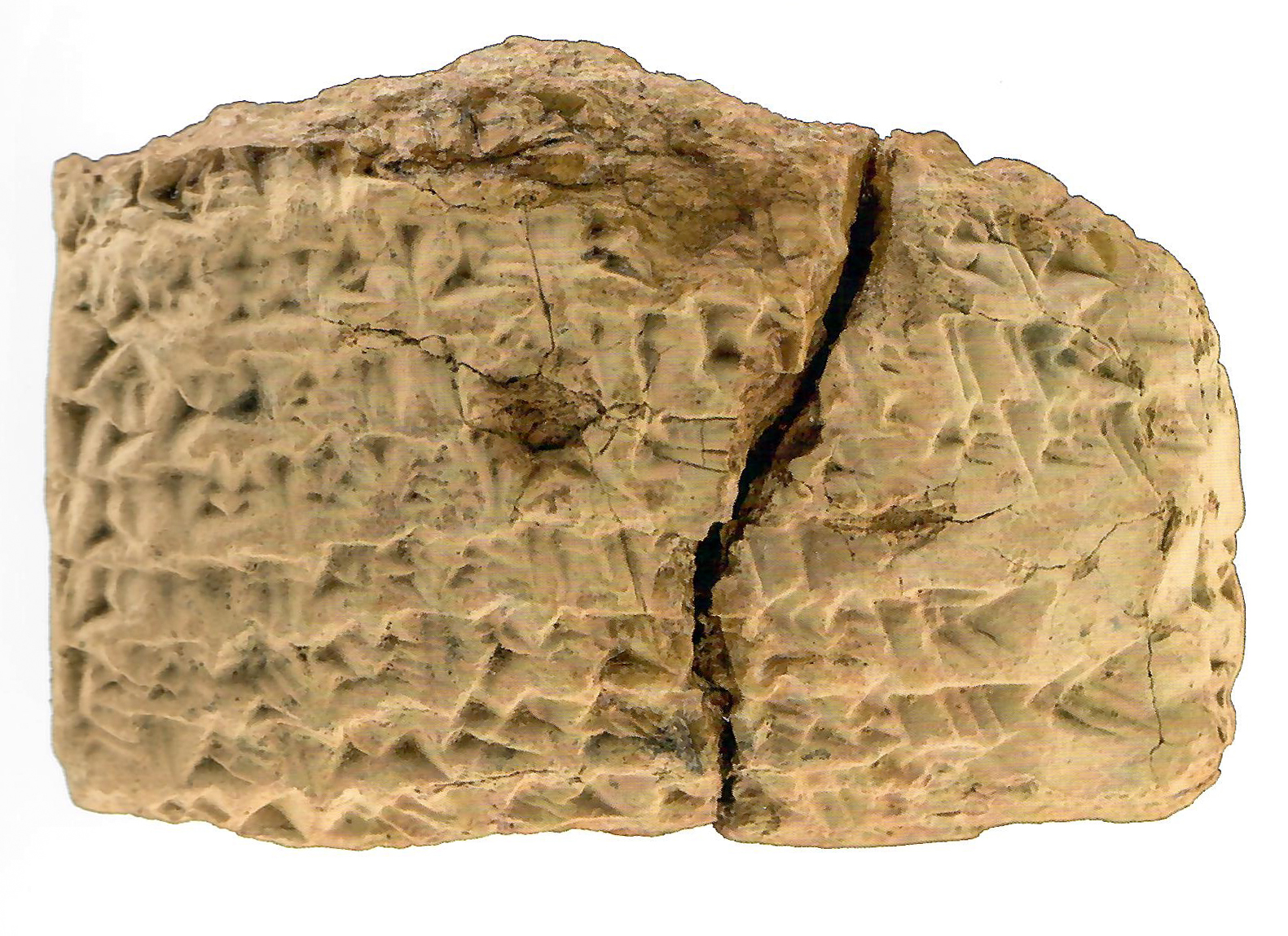
Promissory Note for Dates, 512 BCE
"Witnesses: Tub-Ya son of Nir-Ya(ma)... (Written in) Al-Yahudu, on the 3rd day of Elul, year 10 of Darius, king of Babylon and the lands."
A cuneiform with a promissory note dating back to 512 BCE shows that life continued in the Babylonian exile under King Darius.
It reads: "Witnesses: Tub-Ya son of Nir-Ya(ma)... (Written in) Al-Yahudu, on the 3rd day of Elul, year 10 of Darius, king of Babylon and the lands."
The Collection of David Sofer,
Photo by Ardon Bar-Hama
created with
WordPress Website Builder .